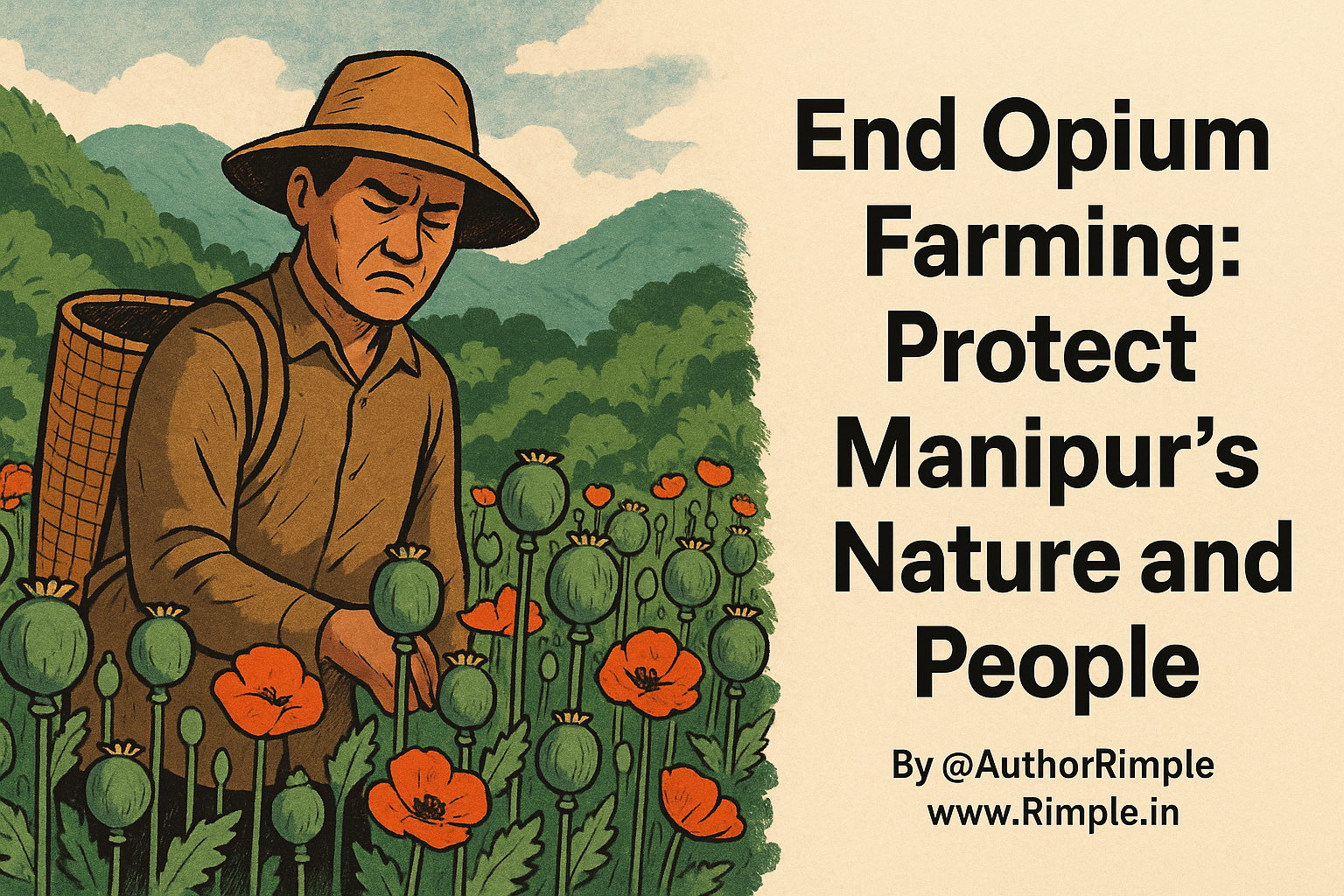Manipur, a beautiful state in Northeast India, is facing a big problem. People are growing opium poppies illegally, and it’s harming the environment and the community. The call to “Stop Opium Cultivation in Manipur and Save Manipur from Environmental Disasters” is about protecting the state’s forests, rivers, and people. Let’s explore this issue step by step, from how it started to what’s being done to fix it, in simple language anyone can understand.
What Is Opium Cultivation?
Opium comes from a plant called the poppy. When farmers grow these plants illegally, they make opium gum, which is used to create drugs like heroin. In Manipur, this is happening in the hilly areas, especially in districts like Kangpokpi, Ukhrul, and Churachandpur.
- Why do farmers grow poppies? It’s quick money! Poppies take just three months to grow, and they sell for a high price.
- Where is this happening? Mostly in remote hills, where it’s hard for police to reach.
- Why is it a problem? It destroys nature and causes drug addiction in the community.
How Did This Problem Start?
Manipur has faced challenges for a long time, like poverty and conflicts between different communities. Many people in the hills, especially tribal groups like the Kuki and Naga, struggle to earn a living. Growing poppies became an easy way to make money.
- Poverty pushed farmers: With few jobs, poppies seemed like a fast way to earn cash.
- Near Myanmar: Manipur is close to Myanmar, a country known for making illegal drugs. This makes it easy to sell poppies across the border.
- Started small, grew big: By 2017, thousands of acres of land were being used for poppies.
Why Is Opium Farming Bad for the Environment?
Growing poppies is hurting Manipur’s beautiful nature. Here’s how:
1. Cutting Down Forests
- Farmers clear forests to make space for poppy fields.
- From 1987 to 2021, Manipur lost about 877 square kilometers of forests—that’s like losing thousands of football fields!
- Without trees, animals lose their homes, and the land becomes weak.
2. Damaging the Soil
- Cutting trees causes soil to wash away during rains, leading to landslides.
- Farmers use harmful chemicals to grow poppies faster, which makes the soil bad for other crops.
- Some land is now so damaged it can’t grow anything anymore.
3. Polluting Water
- Chemicals from poppy fields flow into rivers and lakes, making water dirty.
- This hurts fish, plants, and even people who depend on clean water.
4. Losing Wildlife
- Manipur’s forests are home to unique animals and plants.
- Clearing land for poppies destroys their homes, reducing the state’s natural beauty.
How Does It Affect People?
Opium farming doesn’t just hurt nature—it harms people too.
- Drug Addiction: The drugs made from poppies, like heroin, are causing addiction. About 1.4 lakh young people in Manipur are struggling with drugs.
- Health Problems: Drug use spreads diseases like HIV. For example, a family in Churachandpur lost loved ones because of drug-related illnesses.
- Fighting Between Communities: The government’s efforts to stop poppy farming have caused tensions. Some groups feel targeted, leading to violence since 2023, with over 250 people killed and 60,000 displaced.
What Is the Government Doing?
In 2018, Manipur’s Chief Minister, N. Biren Singh, started a “War on Drugs” to stop poppy farming and drug problems. Here’s what’s been done:
- Destroying Poppy Fields: From 2017 to 2024, the government cleared over 19,000 acres of poppy fields.
- Using Technology: Satellites from ISRO and NASA help find poppy fields in remote areas.
- Arresting Growers: Police have arrested people growing or selling poppies, but it’s risky—some armed groups fight back.
By 2024, poppy farming dropped by 60%, from 28,599 acres in 2021 to 11,288 acres. That’s a big win, but the problem isn’t gone.
Why Is It Hard to Stop?
Even with the government’s efforts, stopping poppy farming is tough:
- Farmers Move to New Areas: When fields are destroyed, farmers start growing poppies in more hidden places, like deeper in the forests.
- High Profits: Poppies earn more money than other crops, so farmers keep growing them.
- Myanmar’s Role: Drugs flow easily across the border, making it hard to stop the trade.
- Community Tensions: Some groups feel the government is unfair, which causes fights and makes the problem worse.
How Can We Save Manipur?
To stop opium farming and save Manipur’s environment, we need more than just destroying fields. Here are some ideas:
1. Give Farmers Other Ways to Earn
- Help farmers grow crops like tea or fruits that make good money.
- Start programs like tourism to create jobs.
- In 2022, the government began helping farmers in nine hill districts try new crops, but more support is needed.
2. Fix the Environment
- Plant new trees to replace the lost forests.
- Protect rivers and lakes from chemicals.
- Teach farmers how to grow crops without harming the land.
3. Help People with Addiction
- Build centers to help young people stop using drugs.
- Spread awareness about the dangers of drugs like heroin.
4. Work Together
- Talk to all communities, like the Kuki and Meitei, to avoid fights.
- Make sure everyone feels included in plans to stop poppy farming.
5. Stronger Borders
- Guard the border with Myanmar to stop drug smuggling.
- Use technology to keep tracking poppy fields.
A Brighter Future for Manipur
Manipur is a state with green hills, sparkling rivers, and rich cultures. But opium farming is hurting its beauty and its people. By stopping this illegal activity, we can save the forests, clean the water, and protect the community. The government has made progress, but it needs to work with farmers and locals to find better solutions. Together, we can stop opium cultivation and save Manipur from environmental disasters, making it a healthier, happier place for everyone.
Also Read:





